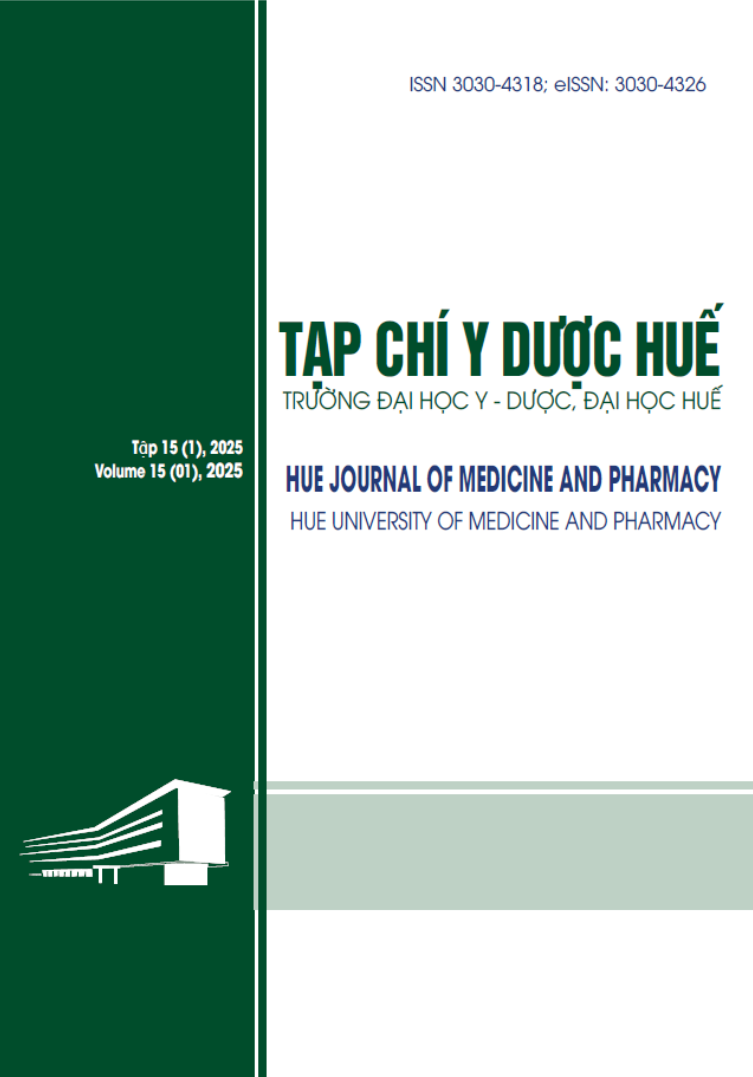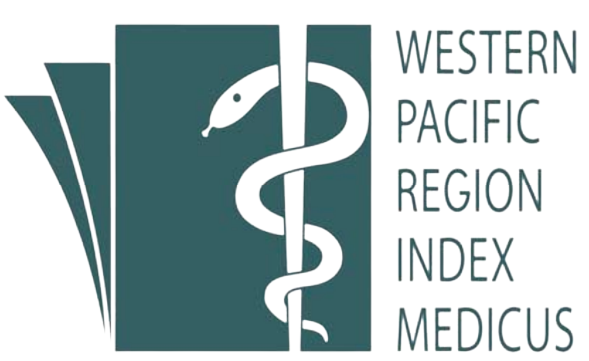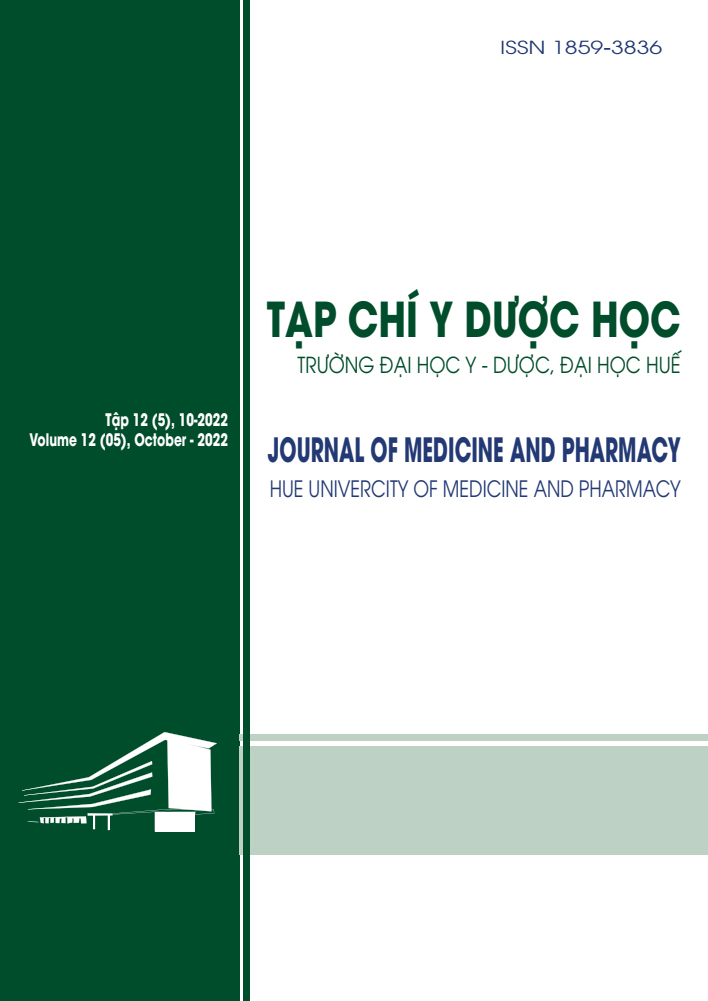Abstract
Background: Nutrition is closely related to human health. Unhealthy diet increases the risk of non-communicable diseases such as cardiovascular disease, diabetes, hypertension, overweight and obesity. Changing eating habits and unhealthy behaviors can last a long time and affect the future.
Objectives: (1) To describe the eating behaviors of first-year medical students at University of Medicine and Pharmacy, Hue University, (2) To identify some factors related to the eating behaviors of these students.
Methods: A cross-sectional study was conducted on 312 students at Hue University of Medicine and Pharmacy from July 2023 to August 2024. Data were collected by direct interview based on a structured questionnaire. We used a multivariate logistic regression model to identify factors associated with students’ eating behavior.
Results: There was 58.3% of students with poor behavior. Some factors associated with students’ eating behaviors were sex, monthly allowance, physical activity, bedtime, time spent for using the Internet, desire to change diet, with a significance level of p<0.05.
Conclusion: Medical students have a high proportion of poor eating behavior. Our study emphasizes the importance of getting more than six hours of sleep and reducing internet use among students, while also providing education on healthy diets to encourage positive changes in eating habits. Additionally, encouraging students to engage in physical activities contributes to maintaining a healthy lifestyle.
| Published | 2025-05-09 | |
| Fulltext |
|
|
| Language |
|
|
| Issue | Vol. 15 No. 2 (2025) | |
| Section | Original Articles | |
| DOI | 10.34071/jmp.2025.2.23 | |
| Keywords |

This work is licensed under a Creative Commons Attribution-NonCommercial-NoDerivatives 4.0 International License.
Copyright (c) 2025 Hue Journal of Medicine and Pharmacy
WHO. Noncomunicable diese. https://www.who.int/news-room/fact-sheets/detail/noncommunicable-diseases
Maneschy I, Moreno LA, Ruperez AI, Jimeno A, Miguel-Berges ML, Widhalm K, et al. On behalf of The Helena Study Group. Eating Behavior Associated with Food Intake in European Adolescents Participating in the HELENA Study. Nutrients. 2022 Jul 24;14(15):3033.
Nasrullah MH, Haider MJ, Arif M, Zahid MN, Iftikhar S, Mahmood S, et al. Eating disorders and disordered eating behaviors among undergraduate students in Pakistan as measured by eating disorder examination questionnaire (EDE-Q). Cureus. 2024 Apr 27;16(4):e59158
Gallo LA, Gallo TF, Young SL, Fotheringham AK, Barclay JL, Walker JL, Moritz KM, Akison LK. Adherence to Dietary and Physical Activity Guidelines in Australian Undergraduate Biomedical Students and Associations with Body Composition and Metabolic Health: A Cross-Sectional Study. Nutrients. 2021 Oct 3;13(10):3500. doi: 10.3390/nu13103500. PMID: 34684500; PMCID: PMC8538134.
Reuter PR, Forster BL, Brister SR. The influence of eating habits on the academic performance of university students. J Am Coll Health. 2021 Nov-Dec;69(8):921-927. doi: 10.1080/07448481.2020.1715986. Epub 2020 Feb 6. PMID: 32027236.
Whatnall MC, Patterson AJ, Burrows TL, Hutchesson MJ. Higher diet quality in university students is associated with higher academic achievement: a cross-sectional study. J Hum Nutr Diet. 2019 Jun;32(3):321-328. doi: 10.1111/jhn.12632. Epub 2019 Feb 27. PMID: 30810252.
Martínez Álvarez JR, García Alcón R, Villarino Marín A, Marrodán Serrano MD, Serrano Morago L. Eating habits and preferences among the student population of the Complutense University of Madrid. Public Health Nutr. 2015 Oct;18(14):2654-9. doi: 10.1017/S1368980015000026. Epub 2015 Feb 16. PMID: 25683651; PMCID: PMC10277198.
Diệp, P. B. ., & Ngân, L. T. . (2022). Summaryassociated factors with intention to use fast food of students at hanoi medical university, academic year 2020-2021. Tạp Chí Y học Dự phòng, 32(6), 54–62. https://doi.org/10.51403/0868-2836/2022/797
Faris ME, Vitiello MV, Abdelrahim DN, Cheikh Ismail L, Jahrami HA, Khaleel S, Khan MS, Shakir AZ, Yusuf AM, Masaad AA, Bahammam AS. Eating habits are associated with subjective sleep quality outcomes among university students: findings of a cross-sectional study. Sleep Breath. 2022 Sep;26(3):1365-1376. doi: 10.1007/s11325-021-02506-w. Epub 2021 Oct 6. PMID: 34613509.
Sakamaki R, Toyama K, Amamoto R, Liu CJ, Shinfuku N. Nutritional knowledge, food habits and health attitude of Chinese university students: a cross sectional study. Nutr J. 2005;4(4)
Helbach A, Dumm M, Moll K, Böttrich T, Leineweber CG, Mueller W, Matthes J, Polidori MC. Improvement of Dietary Habits among German Medical Students by Attending a Nationwide Online Lecture Series on Nutrition and Planetary Health (“Eat This!”). Nutrients. 2023 Jan 22;15(3):580. doi: 10.3390/nu15030580. PMID: 36771284; PMCID: PMC9920441.
Mikolajczyk R, El Ansari W, Maxwell A. Food consumption frequency and perceived stress and depressive symptoms among students in three European countries. Nutr J. 2009;8(1):31. doi: 10.1186/1475-2891-8-31.
Alzahrani SH, Saeedi AA, Baamer MK, Shalabi AF, Alzahrani AM. Eating Habits Among Medical Students at King Abdulaziz University, Jeddah, Saudi Arabia. Int J Gen Med. 2020 Mar 5;13:77-88
Global School-based HealthStudent Survey. WHO. Global School-basedStudent Health Survey. Accessed Nov14, 2022.
Tú, N. M., Yến, H. T. B., Thắm, L. T. T., Khuyên, N. N. B., Liễu, Đ. T., Tâm, T. T. Q., ... & Gia, N. T. (2023). 27. Summary eating habits and their associated factors among the students of two secondary schools in hue city. Tạp chí Nghiên cứu Y học, 164(3), 223-236.
de Courten, M. (2002). Developing a simple global physical activity questionnaire for population studies. Australasian Epidemiologist, 9(2), 6-9.
Viện Dinh dưỡng Quốc gia. Tháp Dinh dưỡng hợp lý cho người trưởng thành (giai đoạn 2016 - 2020) - Mức tiêu thụ trung bình cho một người trong một ngày. https://viendinhduong.vn/vi/dinh-duong-hop-ly/thap-dinh-duong-hop-ly-cho-nguoi-truong-thanh-giai-doan-2016---2020---muc-tieu-thu-trung-binh-cho-mot-nguoi-trong-mot-ngay.html
World Health Organization Western Pacific (WPRO)và International Diabetes Institute (IDI) (2000). The Asia -Pacific perspective: Redefining obesity and its treatment.
Nguyễn Thị Mỹ Dung, Khương Quỳnh Long, Thái Thanh Trúc. Rối loạn ăn uống và các yếu tố liên quan ở sinh viên Y khoa tại thành phố Hồ Chí Minh. Tạp chí Y Học TP. Hồ Chí Minh * Tập 24 * Số 1 * 2020.
Linh, N. T. T. ., Tuấn, P. N. ., Thuận, H. T. ., Phước, N. B. ., & Thắm, N. T. . (2023). Thực trạng và một số yếu tố liên quan đến ăn bữa sáng của sinh viên ngành Y học dự phòng trường Đại học Y Dược Hải Phòng năm 2022. Tạp Chí Y học Dự phòng, 33(1 Phụ bản), 19. https://doi.org/10.51403/0868-2836/2023/986
Wang X., Ouyang Y., Liu J., Zhu M., Zhao G., Bao W., Hu F.B. Fruit and vegetable consumption and mortality from all causes, cardiovascular disease, and cancer: Systematic review and dose-response meta-analysis of prospective cohort studies. BMJ. 2014;349:g4490. doi: 10.1136/bmj.g4490
Ngô, M. U., & Phạm, T. L. A. (2023). Summary dietary intake & nutritional status of public health students of university of medicine and pharmacy at Ho Chi Minh city in 2022. Tạp Chí Y học Việt Nam, 529(2). https://doi.org/10.51298/vmj.v529i2.6472
ugan A. Fast Food Still Major Part of U.S. Diet. [(accessed on 6 August 2013)];2013 Available online: http://news.gallup.com/poll/163868/fast-food-major-part-diet.aspx [Ref list]
Ul Haq I, Mariyam Z, Li M, Huang X, Jiang P, Zeb F, Wu X, Feng Q, Zhou M. A Comparative Study of Nutritional Status, Knowledge Attitude and Practices (KAP) and Dietary Intake between International and Chinese Students in Nanjing, China. Int J Environ Res Public Health. 2018 Sep 3;15(9):1910. doi: 10.3390/ijerph15091910. PMID: 30177588; PMCID: PMC6165259.
Wu M, Xi Y, Huo J, Xiang C, Yong C, Liang J, Zou H, Pan Y, Xie Q, Lin Q. Association between Eating Habits and Sodium Intake among Chinese University Students. Nutrients. 2023 Mar 24;15(7):1570. doi: 10.3390/nu15071570. PMID: 37049412; PMCID: PMC10097125.
Baydemir C, Ozgur EG, Balci S. Evaluation of adherence to Mediterranean diet in medical students at Kocaeli University, Turkey. J Int Med Res. 2018 Apr;46(4):1585-1594. doi: 10.1177/0300060518757158. Epub 2018 Feb 14. PMID: 29444610; PMCID: PMC6091843.
Deslippe AL, Bergeron C, Cohen TR. Boys and girls differ in their rationale behind eating: a systematic review of intrinsic and extrinsic motivations in dietary habits across countries. Front Nutr. 2023 Sep 29;10:1256189.
Monteiro LZ, Varela AR, Lira BA, Contiero LC, Carneiro MLA, Souza P, Nóbrega JOT, Júnior FB. Weight status, physical activity and eating habits of young adults in Midwest Brazil. Public Health Nutr. 2019 Oct;22(14):2609-2616. doi: 10.1017/S1368980019000995. Epub 2019 May 31. PMID: 31148525; PMCID: PMC10260673.
Kożybska M, Radlińska I, Czerw A, Dykowska G, Karakiewicz B. There Are Predictors of Eating Disorders among Internet Use Characteristics-A Cross-Sectional Study on the Relationship between Problematic Internet Use and Eating Disorders. Int J Environ Res Public Health. 2021 Sep 29;18(19):10269. doi: 10.3390/ijerph181910269. PMID: 34639567; PMCID: PMC8508531.







